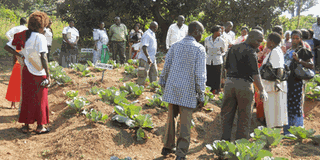Prime
Farmer's Diary: Teaching rural farmers about vegetable production

Farmers learn about vegetable production at Kamenyamiggo District Agricultural Training and Information Centre in Lwengo District last week. Photo by Michael J. Ssali.
Most smallholder farmers grow food not just to sell it but also to eat it themselves. The majority however don’t seem to fully understand the nutritional value of the food crops they produce and must be helped to appreciate the nutrients they miss when they ignore making some of the food crops part of their diet. Even for rural farmers, the regular intake of all the required nutrients in the right proportions is a pre-requisite for healthy living.
Our farmers also need more knowledge about food preservation to continue consuming all the necessary dietary components during periods of scarcity. The knowledge about simple food processing and food preservation will also enable them to sell the food items during periods when there is no production on the farms or to wait and sell when the prices are favourable.
We cannot talk about food security without talking about good nutrition. Farmers must be encouraged to grow all the crops needed for providing a balanced diet, including vegetables and fruits. The National Livestock Resources Research Institute is spearheading a drive to teach rural farmers about vegetable production and food preservation.
But why don’t most of our farmers put emphasis on such activities as vegetable production? This was the question that Ms Proscovia Nankya, a facilitator from PDS Agro-consult Ltd, Kampala, put to farmers attending a one-day-workshop at Kamenyamiggo District Agricultural Training and Information Centre (DATIC) in Lwengo District on February 8, 2011.
Some vegetables are not such important food items as bananas, potatoes, or cassava. Vegetables might not easily fill up a hungry person’s tummy and it is not often that one finds a family that solely depends on just vegetables but, consumed along other foods in the right proportions, vegetables are major body nourishments. They are important for digestion and a major source of vitamins.
It was highlighted that in most of our native cultures, vegetables are not highly regarded as good food. Chicken, meat or fish seem to be the most preferred dishes for a visitor, not beans or vegetables. When the head of a family returns home with vegetables, they don’t normally attract as much excitement as meat or fish. They tend to be regarded as the poor man’s food.
Some of the farmers said most traditional vegetables are only seasonal - only available during the rainy season. Vegetable production still depends mostly on nature - the vegetables growing on their own as weeds in the field and the farmer just ‘collecting and gathering’ them like in the prehistoric days!
The new campaign, funded by ASARECA (Association for Strengthening Agricultural Research in Central and East Africa) aims at drawing the attention of rural farmers to the great nutritional value of vegetables and to equip them with the skills to grow them throughout the year and to appreciate that there is a great demand for them as well as the accompanying financial rewards.
With increased education and incomes, town dwellers have become more sophisticated and selective with regard to what they eat and there is a much bigger demand now for vegetables. An economical housewife these days keeps a vegetable garden in the backyard for the family to save money that would be spent on buying the vegetables from the market.
Ms Nankya took the farmers through a long lesson about vegetable growing - nursery preparation, seed selection, the pests and diseases that attack vegetables and how to fight them, when to harvest them, how to prepare them for eating, and how to preserve them. She emphasised to the farmers never to ignore traditional vegetables and to cherish them. She taught them about mixing animal manure with the soil. She also warned the farmers about the mindless application of pesticides on the vegetables.
“Always seek the guidance of agricultural extension workers before you apply the pesticides to ensure you use the right doses,” she said. “Too much pesticides or their untimely application on the vegetables may cause health hazards to the consumers, who could be your own family members or even yourselves.”
Dr Jolly Kabiriizi a research scientist from the National Livestock Resources Research Institute said the farmers are to undergo training in drip irrigation installation on their vegetable gardens and to be trained in rainwater harvesting. The idea is to make vegetable production continuous throughout the year including times of rain scarcity.
Since farmers are encouraged to keep animals, the animals’ droppings will always keep the soil well nourished and with the availability of harvested rainwater, no farmer should experience difficulties with vegetable production. The left over vegetables will serve as fodder for the animals, making farming more sustainable as the crops and the animals will be interdependent.




